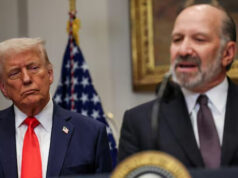Kim Yo Jong, the influential sister of North Korean leader Kim Jong Un, has voiced strong criticism over the presence of a U.S. nuclear submarine in South Korea. According to state media KCNA on Tuesday, Kim condemned the arrival of the USS Vermont at the South Korean port of Busan, describing it as evidence of U.S. intentions to “bring out its nuclear strategic assets, show off its strength, and increase threats” in the region. This statement reflects North Korea’s ongoing disapproval of U.S. military activities on the Korean Peninsula.
The USS Vermont, a nuclear-powered submarine, docked at a naval base in Busan on Monday for routine resupply and crew rest, according to South Korea’s Yonhap news agency, which cited the South Korean navy. The arrival of the submarine is seen as part of the U.S.’s continued commitment to its military alliance with South Korea, particularly in the face of growing security threats from North Korea.
Rising Tensions Amid Diplomatic Meetings
Kim Yo Jong’s sharp remarks followed a key meeting between the foreign ministers of South Korea, the United States, and Japan, held on the sidelines of the United Nations General Assembly. During the meeting, the ministers expressed concerns about North Korea’s recent actions, including the country’s unveiling of its uranium enrichment facilities and its increasing military cooperation with Russia. These activities were deemed “unlawful” by the three nations.
The ministers also discussed plans for a trilateral summit to be held later this year, aimed at deepening cooperation among the three countries and addressing the regional security challenges posed by North Korea’s nuclear programme.
Persistent Regional Tensions
The presence of U.S. military forces in South Korea has long been a source of tension on the Korean Peninsula. North Korea views these deployments, particularly the arrival of nuclear-capable assets like submarines, as a direct threat to its sovereignty and security. Kim Yo Jong’s criticism reflects the broader tension between the U.S. and North Korea, as the two countries remain locked in a standoff over military presence and nuclear capabilities.
As the U.S. continues its military presence in South Korea to reassure its allies in the region, these actions are likely to provoke further reactions from North Korea, which perceives such moves as provocative and hostile.
(With Inputs from Reuters)
Research Associate at StratNewsGlobal, A keen observer of #China and Foreign Affairs. Writer, Weibo Trends, Analyst.
Twitter: @resham_sng





